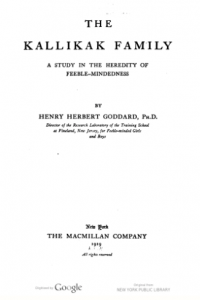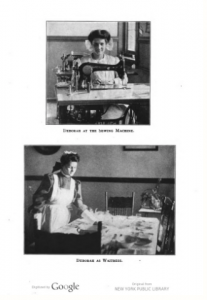
Front cover of Goddard’s publication https://babel.hathitrust.org/cgi/pt?id=nyp.33433010824211;view=1up;seq=25

Photographs of Deborah “Kallikak” in Goddard’s training school https://babel.hathitrust.org/cgi/pt?id=nyp.33433010824211;view=1up;seq=25
As discussed above, there was large debate during the 1910s about the right for women with disabilities to reproduce. Henry H. Goddard, a psychologist, did a case study on a family he referred to as the “Kallikak” family, specifically focusing on Deborah “Kallikak” who was a patient at Goddard’s training school. Goddard’s book contains journal entries, pictures, data, family trees, and his findings from the case study. Goddard used this case study to support his hypothesis that intellectual disabilities, or what he referred to as “feeble-mindedness” is hereditary. Due to the fact Goddard was a eugenicist, he used his findings to support sterilization and the limitation of the reproduction of women with intellectual disabilities. Goddard’s findings spread widely throughout the nation, helping to grow the popular conceptions and stereotypes about individuals with disabilities.
